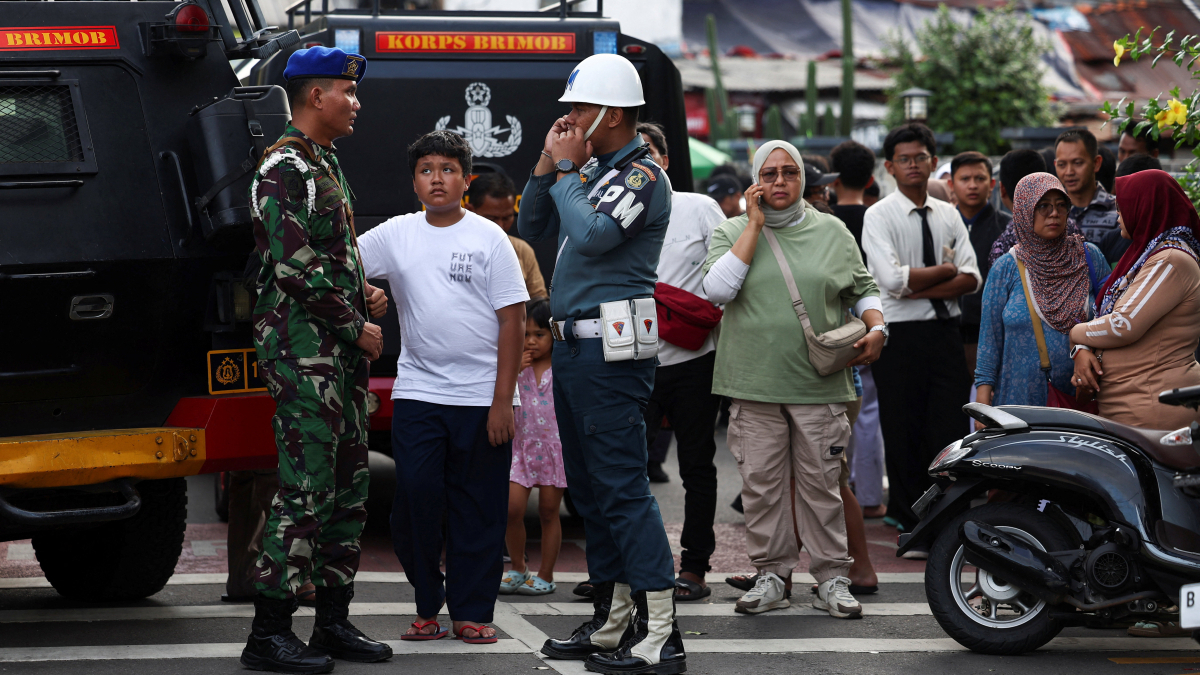The White House: U.S. ground troops ‘not part of plan’ in Iran
The White House says deploying United States ground troops in Iran is not currently part of the military strategy in ...

An Indonesian student suspected of carrying out a bomb attack at his school mosque in Jakarta wrote of feeling isolated in his 42-page diary and drew inspiration from a Telegram group glorifying white supremacist attacks, according to new details from police.
The early‑November explosions struck worshippers as they lined up for Friday prayers, injuring 96 people and scattering shoes, prayer mats and glass across the courtyard.
"He wanted to be recognised by members of the online community … because he feels lonely," Jakarta police spokesperson Reonald Simanjuntak said.
Police said the student, who is being treated as a "child facing the law" under Indonesia's juvenile crime regulations and has not been formally identified, acted alone, building seven small bombs at home by following instructions from YouTube videos.
He sourced materials such as potassium chloride and nails from online marketplaces without setting off alarm bells, a security lapse police said they will examine closely.
Four of the devices detonated while three failed to explode.
Simanjuntak said the teenager joined an international Telegram channel where members shared violent material and discussed past attacks, including the 2019 massacre at mosques in Christchurch, New Zealand, and the 1999 shootings at Columbine High School in the United States.
The press office of Google, which owns YouTube, did not immediately respond to request for comment.
Police plan to question the suspect soon. He is in stable condition in hospital, recovering from injuries sustained when an apparent suicide device intended to kill him failed to detonate properly.
Before formally charging him, the country's parole and probation office will determine whether the teenager is eligible to stand trial and what form any legal proceedings should take, Simanjuntak said.
The office will also decide whether he should be handed over to the state or returned to his parents, he added, without providing a timeline.
U.S. President Donald Trump said the U.S. military has enough stockpiled weapons to fight wars "forever"; in a social media post late on Monday. The remarks came hours before conflict in Iran and the Middle East entered its fourth day.
U.S. first lady, Melania Trump chaired a UN Security Council meeting on children and education in conflict on Monday (2 March), a move criticised by Iran as hypocritical following U.S. and Israeli strikes that triggered a UN warning about risks to children.
A torpedo from a U.S. submarine sunk an Iranian warship off the coast of Sri Lanka, U.S. Secretary of Defense, Pete Hegseth told reporters as the Iranian conflcit entered its fifth day on Wednesday.
The U.S. embassy in Riyadh was hit by two drones resulting in a limited fire and some material damage, the kingdom's defence ministry said in a post on X on Tuesday, citing an initial assessment.
Shahid Motahari Sub-Speciality Hospital in northern Tehran and parts of the Golestan Palace were bombed on day two of the U.S.‑Israel strikes. AnewZ Touraj Shiralilou is in Iran's capital city and said that the facility was flattened in an airstrike.
The White House says deploying United States ground troops in Iran is not currently part of the military strategy in the ongoing conflict with Tehran.
Israel has warned residents to leave a significant area in southern Lebanon, instructing them to move north of the Litani River as hostilities with the Iran-backed Lebanese group Hezbollah intensified on Wednesday.
U.S. Defense Secretary Pete Hegseth says the United States is making gains in its conflict with Iran after a key Iranian naval target was destroyed, confirming that the strike was carried out by a U.S. submarine off the coast of Sri Lanka. Rescue efforts are now under way for the ship’s crew.
Start your day informed with AnewZ Morning Brief. Here are the top news stories for the 4th of February, covering the latest developments you need to know.
Strikes across the Middle East are intensifying, fuelling travel disruption, driving up global energy prices and forcing diplomatic missions to shut their doors.
You can download the AnewZ application from Play Store and the App Store.

What is your opinion on this topic?
Leave the first comment